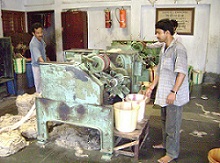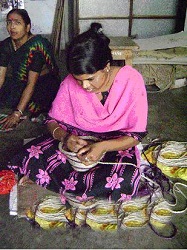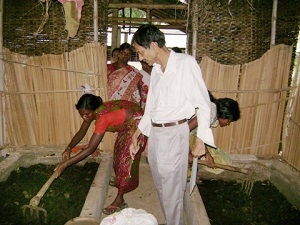Rural Development Programmes - Pallimangal

‘Pallimangal’ is the Bengali word, meaning rural welfare. Obviously Ramakrishna Mission Pallimangal, Kamarpukur, Hooghly has been working in villages since its inception for the upliftment of the poor and downtrodden with an emphasis on the women folk through its health, education, economic, social and cultural development programmes under the direct supervision of its headquarter at Belurmath, Howrah.
The rural women by nature are attentive, disciplined and hard working. Some honest and proper guidance can make them efficient working persons resulting tremendous social development. The source of all power, The Holy Mother Sri Ma Sarada Devi at her very young age set an example to the world by making ‘holy thread’ from cotton with her mother at home. In the year 1905, when the freedom movement had taken a new shape and the people were suffering due to the acute shortage of cotton clothing, the inhabitants of the ‘Koalpara Ashrama’ at Bankura district were inspired by The Holy Mother for making cotton threads by ‘Charka’ (handloom). It is learnt that The Holy Mother also wanted to engage herself in making cotton threads by charka. It has been realized that where millions of people are living below poverty line in the miserable conditions, only economic help and academic education can not solve the problem. Unemployment being the main cause, it has been justified that aged persons, house wives and those who desperately need some income to support their families are best to give vocational training enabling them to earn some money to compete their need.
Swami Vivekananda expressed that the women must be taken ahead as they are the main source of all power and its development. Keeping this word in mind the Ramakrishna Mission, Pallimangal has been successfully running several rural development programmes including self reliance vocational training and production as well as marketing support system in weaving, jute handicrafts, incense stick making, food processing etc. with the primary objective of helping of poor and destitute women folk by providing them some opportunities of income generation and thereby improving their economic as well as social status.
Soil Testing Laboratory

Considering the needs and priorities of the area, the soil testing laboratory was established at Kamarpukur in the year 1983. The objective was to encourage the farming community for scientific agriculture with balanced use of plant nutrients for higher production, economy in input cost, maintenance of soil health and reduction in environmental pollution etc. The area is one of the most intensively cultivated areas of West Bengal. The laboratory caters to the need of the farmers of Hooghly and surrounding other districts also.
The following figures depict the performance of this laboratory during the year 2013-14:
Soil samples received from Govt. Dept. - 26
Total soil tested during the year - 26
Food Processing Programme

Considerable quantities of fruits and vegetables such as tomato, green mango, potatoes,
pineapples etc. are either wasted or not utilised fully every year during the season.
This Food Processing Unit was launched during the year 2001 with support and co-operations from Ministry to the Industry of Food Processing, New Delhi and Directorate of food processing Industries and Horticulture, Government of West Bengal. An objective of promoting cottage industries with locally available resources, minimizing wastage of perishable fruits and vegetables and for showing the farmers new source of marketing and simultaneously creating new income opportunities for unemployed poor and destitute persons. At present 8 different items like Pickle, Jam, Jelly, Sauce, Squash, Kasundi, Papad and Snacks are being produced in our unit and received very good response and demand from the customers. These are also supplied to different places as per demand.
The unit is being utilized also as a small production centre to help trained willing persons to work and earn some money. They are successfully working under supervision of a staff member and at present 20 different items e.g. different types of jam, jelly, sauce, pickles, squash, papad, kasundi, potato chips etc. are being produced in the unit with overwhelming response and demand from the customers all over India. The well known dairy farm ‘Mother Dairy’ has been selling some of the products through its booths in Calcutta with very good responses At present following different items Jam, Jelly, Pickles, Sauce, Squash, Kasundi, Papad, Snacks etc are being produced in our unit and received very good response and demand from the customers.
Mini Jute Spinning Unit

This unit has been manufacturing twine from raw jute regularly since its inception in the year 1987. The project was commenced in collaboration with erstwhile Jute Technological Research Laboratories (now NIRJAFT), Department of Science & Technology of Govt. of India and that of Government of West Bengal. The idea was to bring the processing unit at the level of jute growers to help the jute farmers and to provide employment to some rural youths.
No. of persons employed - 7
Total Production - 22.4 MT
Weaving Project

The weaving project has been functioning satisfactorily since its birth. Handloom weaving and stitching of products are being done here by women workers.At least 25 different types of cotton items are being produced regularly at the unit. They are namely, bed sheet, towel, handkerchief, duster, mats, side bag, carpet, dining roll (asana), chaddar (wrapper), muffler etc. Dhoti, uttariya and sarees have been produced by our unit in the village Avirampur. At least 33 poor and destitute women are engaged in this unit as production basis wage workers. On an average 7 of them earns more than Rs.500/- per month and 1 or 2 of them earns more than Rs.1000/- per month. Apart from this, some persons are engaged in weaving production in the unit at the village Bhurkunda. Five poor women including one handicapped woman are engaged in a unit at Nakunda village under this project. A few numbers of women have been trained successfully during the reporting year.
No. of women employed - 27
No. of items produced - 12
Jute Handicraft Project

The Indian soil specially north-eastern part having gangetic water is very fertile and suitable for jute cultivation. Many farmer used to depend on the income from selling raw jute. There were many jute mills in the West Bengal producing jute sacks etc. However destructive and harmful synthetic material replaced jute products resulting in closing of mills and stopping cultivation. However through the research and development of the jute products the cultivation as well as mills are coming alive day by day and slowly hundreds of jute products specially jute bags are replacing synthetic items with popularity and demand.
The Ramakrishna Mission Pallimangal, Kamarpukur with help of National Centre for Jute Diversification, (NCJD) Ministry of textile, Government of India has been successfully implementing the project of jute handicraft since the year 2000. Now it has taken a new dimension; as soon as a group of young enthusiastic but poor and destitute women; after being trained successfully, have been engaged at the Pallimangal Workshop as production basis wage workers. On an average they earn more than Rs.3500 per month individually whereas others earn above Rs.2000/- per month. Some of them work at Bhurkunda, Hazipur and individually at their houses. Those women working at the workshop at Kamarpukur are provided with mid-day supplementary nutrition at free of cost. Different types of fancy bags, decorating items, mobile phone bag, money purse, table mat, pen holder, desk calendar, greetings card cap, office file etc. are being produced and sold at our showroom with good response. In view to motivate to start self employment project different types of training programmes are being arranged in every year regularly with the help of NCJD.
No. of women employed - 85
No. of items produced - 57
Incense Sticks Project

This project has been continued since its inception in the year 1980. Many poor and destitute women have been trained and earning under the project either working at the Kamarpukur workshop or at their home. After being trained many women collect raw materials from the workshop and prepare incense sticks at home at their free time after their household works thus they also support their family economically. All together more than 90 production basis wage workers worked in this project in the reporting year 2008-09. Some of them have earned more than Rs.500/- per month and 1 or 2 persons have earned even more than Rs.1000/- in some months. The products are sold under the brand name of “Sridham Dhoop”. More than 10 different types of incense sticks are being manufactured at present. Out of those, ‘Pure Sandal-wood’, herbal type ‘Arghya’, and one as mosquito repellent have become very popular to the customers. This project is supervised by Sri Arup Banerjee, the trained staff member of Ramakrishna Mission Pallimangal, Kamarpukur. This is also sold in
Pallimangal showroom and supplied to various places as per demand.
No. of women employed - 64
No. of items produced 10 Consisting 100/50/25 sticks - 10
Apiculture Programme

This unit has not only functioning successfully but showing remarkable improvement since started in the year 2002. There is good potentiality for bee-keeping in the locality. Apiculture not only supports the bee-keepers but also helps the farmers through proper pollination of crops. With an object of helping the local people to utilize this potentiality, the programme is being implemented by Pallimangal. Training programmes are conducted from time to time and after completion of course the trainers are provided with bee box and other appliances. Quite a few numbers of unemployed youths are earning good amount of money through this activity. Raw honey is purchased from those bee-keepers and after necessary processing and bottling are sold by Pallimangal.
Mushroom Production Programme

The seed production programme was started in the year 2002 to help the farming community to supply certified seeds with active help and cooperation from the Agriculture Department of Government of West Bengal. In the year 2008, mushroom seed production has been continued successfully since mushroom production is a good income generating activity.
Mushroom is a protein rich having high nutritional value, low cost and can be preserved easily. In present days it is a very popular item in the food market. The cost of production is considerably low, easy to grow and does not require dedicated cultivating land rather it can be grown even in house area.However, proper and reliable mushroom seeds are not always easily available. Hence, mushroom seed production programme has been undertaken in the year 2006. Mushroom seed production was continued successfully till the year 2008, as mushroom production is a good income generating activity. We were unable to continue the programme, due to lack of propagation among common village people. In the year 2012, Poverty alleviation programme was taken on the eve of 150th birth anniversary of Swami Vivekananda, named Swami Akhandananda Seva Prakalpa. In the Seva Prakalpa, further we have introduced a Training programme on mushroom cultivation for the poor villagers during the period of 18/6/2012 To 07/03/2014. Report of the said Seva Prakalpa is given below.

The main aim of the Swami Akhandananda Seva Prakalpa was to ameliorate poverty in ten pockets of a few selected areas identified and subsequently assistance to poor people to overcome the huddles by means of proper trainings and opportunities.
The Prokalpa consists of the following aspects:-1]Training on Vermicompost Production.2]Training on Mushroom Cultivation.3]Training on Tailoring at Beldiha and Kamarpukur.4]Training on Batik Printing.5]Non-Formal Education.6] Awareness on Health and Hygiene.

Training on Modern Method of Mass Scale Production of Edible Mushroom :- The above said training programme was initiated w.e.f August 20th 2012 with same 50 trainees of vermicompost. After theoretical background information in training classes, practical demonstration was conducted simultaneously on improved method of cultivation of mushroom specially Oister, In 1st and 2nd demonstration classes, 40 & amp; 50 balls were cultivated,18.09 k.g & 61.47 k.g Oister mashroom was produced and Rs.1448.00 and Rs.4917.00 was received respectively as sales proceeds, with Rs.80.00 per k.g selling rate. After deduction of actual expenditure, Rs. 5352.00 was distributed among active 46 trainees. Therefore four more demonstration classes were conducted at trainees’ home level in newly built prakalpa aided low cost ideal mushroom cultivation house. A total number of 170,170,215and219 balls were cultivated by the total trainees individually and 135.57kg,68kg,116.1kg,and199.55kg of oyster mushroom was produced and about Rs.13557.00, Rs.8160.00, Rs.11600.00 and Rs.19955.00 was received respectively as sales proceeds selling@Rs.100.00/kg. About 33 active trainees received micro-financial assistance for building up a low cost mushroom cultivation house under this prakalpa ranging financial assistance from Rs.1702.00 to Rs.2850.00. Since the demand of mushroom spawn was found high, a laboratory for spawn production was established by the fund of Akhandananda Seva Prakalpa and spawn production was also initiated. So far 5 times in small scale, spawn produced in newly built laboratory was distributed / sold within the trainees and overall Rs.2000.00-3000.00 or more is being earned per 50 days at individual level depending on the capacity of mushroom cultivation. This is the successfully being continued by the trainees. The said prakalpa as a whole was successfully concluded on march’7th’2014 along with other components / aspects like tailoring, batique printing, non-formal education and awareness on health and hygiene.
Solar Energy Programme

With rapid depletion of the reserve of fossil fuel and increasing environmental pollution use of renewable sources of energy seems to be the only solution to same the environment and to sustain the process of development. Due to its abundance solar energy offers ample scope to be harnessed for providing household electricity especially in un-electrified and under-electrified areas. Pallimangal is trying to promote the use of different solar photovoltaic (SPV) and solar thermal systems through awareness generation and motivation since the year 2001. A few SPV street lights are being used at different places at Kamarpukur. Pallimangal have sold 46 numbers of solar fan caps, 1 no. of radio module and 1 no. of solar lantern during the reporting year 2007-08 through its sales-cum service activities on renewable energy. Sri Samir Roy, Staff member of Pallimangal supervises the programme.
Due to the social, economical, environmental and many practical difficulties a considerable part of our rural populace is yet to see the light of education. Pallimangal has been conducting a number of Non Formal Education centres at different villages to provide minimum literacy to those who failed to reach for regular schooling. Presently 19 such NFE centres for the backward and depressed classes are being run by Pallimangal in 13 villages under 9 Gram Panchyet areas of Goghat-I & II blocks, one in Tarakeswar Municipality and one in Kotalpur, Bankura area through active involvement of village level organizations.
Sales Out-let for Cottage Industry Product

To promote the sales of its’ products as well as for greater exposure and interaction with different customers and artisans a regular showroom cum sales counter is run by Ramakrishna Mission Pallimangal, Kamarpukur near Sri Ramakrishna Temple at Kamarpukur. With the same view the Pallimangal, Kamarpukur participated at ‘Paschim Banga Rajya Hasta Shilpa Mela’ held at Kolkata, and also launched special sales counter at cossipur & Kankurgachi (Yogodyan) Math during ‘Kalpataru Utsav, at Kankurgachi (Yogodyan) Math during ‘Nityabirbhav Utsav’, at Barasat Math during ‘Anual Puja Utsav’ and at Belur Math during ‘Tithi Puja’ and ‘Public Celebration’ Utsav. Total sales at all these places were overwhelming and beyond our expectations. We received huge response from thousands of customers for our different types of products like jute handicrafts, incense sticks, food processing products etc. Two staff members and one volunteer looks after the Kamarpukur show room regularly whereas in addition to staff members of Pallimangal 25-30 volunteers help in sales at the special sales counters in different festivals and exhibitions.